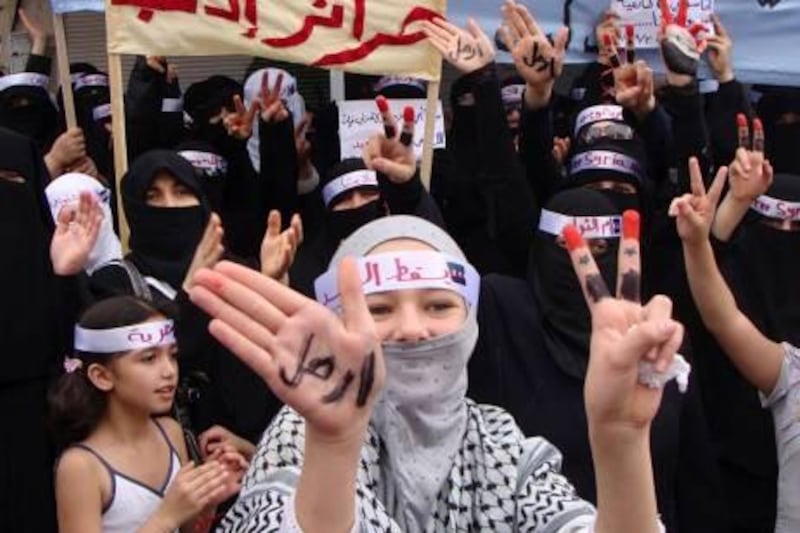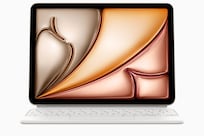DAMASCUS // The Syrian government has reversed its ban on non-essential imports less than two weeks after imposing it.
The about-turn is a signal of the regime's limited room for manoeuvre as it struggles to keep the economy afloat without losing critical political support from business leaders, analysts say.
The ban had been justified as a gesture of support to domestic manufacturers and as a belt-tightening measure to prevent further haemorrhaging of Syria's foreign currency reserves. Those reserves have dwindled because of rising government spending, trade deficits and efforts to prop up the local currency in the face of international sanctions.
But the move fuelled alarm among Syrians already bracing themselves for a bleak economic future. More significantly, it outraged influential business leaders in Damascus and Aleppo who have grown wealthy on importing everything from cars and computers to industrial machinery and paint, and have been key supporters of Bashar Al Assad in his 11 years as president.
The ban was reversed on Tuesday, when Syrian state-run media said it became clear after consultations with business leaders that it had created "more negative repercussions than expected", including immediate price increases that had harmed consumers.
How long the government can keep its core political supporters happy remains uncertain. Damascus dodged further economic sanctions late on Tuesday, when China and Russia vetoed what would have been the first legally binding United Nations Security Council resolution against Syria since the uprising began in mid-March.
Turkey's prime minister, Recep Tayyip Erdogan, said yesterday the reprieve was only temporary and that Ankara would impose its own set of sanctions against its former ally.
The Turkish leader used a speech in South Africa to say pressure would continue to mount on Syria. "Turkey and either some or all of the European Union nations, and who knows which others, will take steps," Mr Erdogan said. "It won't stop our sanctions."
Germany, France, Britain, Denmark and the United States joined Turkey in denouncing the UN veto. The French foreign minister Alain Juppe called Mr Al Assad a "dictator who is massacring his people" and vowed French support for Syrians trying to oust him.
Russia and China both insisted sanctions would do nothing to bring the crisis in Syria to a peaceful solution. With pressure on the Syrian regime coming from many directions, its ability to navigate the political shoals at home is being tested.
"The U-turn on imports shows there are hard limits to what the regime can do," said a Syrian political analyst. "It is between a rock and a hard place. It wants to protect its dollar reserves, but that ended up upsetting the businessmen. In the end, it had to appease the businessmen because that is the biggest short-term concern. It will worry about running out of money if and when the time comes."
Officially, Damascus has about US$17bn (Dh62.44bn) in its strategic currency reserve, enough to pay for two years' worth of imports, although the actual figure may be lower. Economic data on Syria is widely considered unreliable.
Whatever the size of Syria's reserves, Mohammad Nidal Al Shaar, minister of economy and trade, said on Tuesday an alternative system had been devised to protect them, with companies free to pay for imports with privately owned hard currency funds.
The initial order to ban non-essential imports points to an administration whose political agility may be weakening, analysts suggest. Nabil Sukkar, a former World Bank official and leading independent Syrian economist, said the ban had been an impulsive decision reflecting poor planning and poor judgment.
"Following the uproar, the government realised that maintaining the ban will lead to increased local prices, increased smuggling and increased unemployment," he said. "It will also generate retaliation from our trade partners and will harm the credibility of Syrian reform."
A leading opposition activist said the reversal had also underlined the complexity of the crisis facing the regime, and the difficulties of trying to seal the country off from the outside world.
He contrasted Syria's current predicament with the situation in 1982, when the authorities successfully and brutally put down an armed revolt by militants from the Muslim Brotherhood, and then endured a decade of economic hardship and international isolation.
"The regime thinks this is just like the 1980s and that raw power and fear is the answer but we live in a different world now," he said. "Ordinary Syrians will not take to living in isolation again, they will not allow themselves to be shut off from the outside as they were before. There is no way to turn back the clock. That is not how things work any more."
Syrian officials insist they were facing a militant insurgency by Islamist radicals that must be put down with force. At the same time, they have promised political reforms aimed at appealing to a mainstream society disaffected by years of unaccountable, autocratic rule.
The UN and western governments have rejected the government's portrayal of the situation in Syria, and say the regime has violently suppressed a largely peaceful pro-democracy uprising, killing more than 2,700 people in the process.
Syria has come under mounting economic sanctions, from the United States, European Union and, most recently Canada, which this week prohibited investment in Syria's oil sector. Canadian and European oil firms currently work on gas and oil projects in the country.
Economics experts have warned that Syria is edging towards financial disaster, with annual output predicted to decline by 2 per cent this year, according to the International Monetary Fund, which had previously forecast 3 per cent growth. Foreign investors, long courted by the Syrian authorities, have abandoned various multimillion-dollar projects, including plans to build much-needed electricity generation plants.
Nonetheless, Syrian officials remain publicly upbeat, insisting the country will emerge stronger from the crisis. But while Mr Al Assad appears to remain firmly in control - his army units overwhelmed defecting soldiers in the town of Rastan on Sunday after an extended period of fighting - his political opponents were becoming more organised.
A coalition of dissidents and anti-regime political groups, known variously as the National Coordination Committees or National Board of Coordination, was expected to elect a 30-member executive board at a meeting today.
The group is one of two major opposition coalitions. The other - the Syrian National Council (SNC) - held its inaugural meeting in Istanbul on Sunday at which it brought together secular and Islamist dissidents, including the Muslim Brotherhood.
* With additional reporting by the Associated Press





